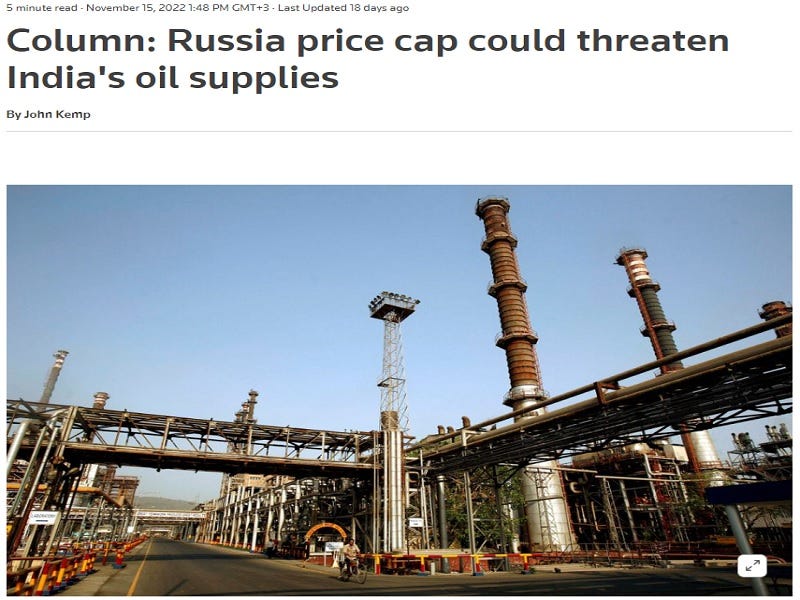Debunking Reuters’ Prior Fearmongering About Russian-Indian Energy Relations
The short-term and purely ephemeral narrative gain of making average folks question the viability of Russian-Indian energy relations was obviously outweighed by this self-discrediting report that tarnished Reuters’ reputation and exposed it as a propaganda platform.
Reuters market analyst John Kemp published a piece in mid-November fearmongering that “Russia price cap could threaten India’s oil supplies”, which warned that the US-led West’s policy that enters into effect on Monday might result in Russia “retaliating by refusing to sell crude and fuels” to India. This was nothing but an information warfare product that was debunked after a senior India official confirmed on Friday that their country will continue purchasing oil from Russia after 5 December.
No serious market analyst would have ever fearmongered about the false scenario that Kemp did since Delhi has repeatedly said that it’ll never unilaterally concede on its objective national interests under foreign pressure whether generally speaking or in terms of its ties with Moscow in particular. Nevertheless, he completely ignored those official policy statements across the past nine months to wildly speculate that their mutually beneficial energy relations would be impacted by the price cap.
Reuters’ editors would have been aware of that since too since their outlet published numerous reports about that policy yet they still decided to release Kemp’s fearmongering piece. This speaks to that platform’s role as a crucial player in the US-led West’s propaganda ecosystem since it indisputably laundered a false narrative about Russian-Indian relations. The purpose behind doing so was to confuse their audience about this globally significant Great Power’s grand strategy.
This contrasts with the emerging trend around that time whereby “Three Recent Articles Proved That The World Is Finally Appreciating India’s Balancing Act”. Reuters remained the outlier by refusing to follow suit, instead choosing to manipulate perceptions about that country’s policies as well as Russia’s. That was a journalistic disservice since it deprived their audience of accurate assessments of this sensitive relationship, which in turn discredited this Mainstream Media (MSM) platform.
The short-term and purely ephemeral narrative gain of making average folks question the viability of Russian-Indian energy relations was obviously outweighed by this self-discrediting report that tarnished Reuters’ reputation and exposed it as a propaganda platform. Kemp could have instead taken a more neutral stance, but his editors evidently wouldn’t have allowed it since their intention in hindsight was to frame those two’s ties as an unnecessary risk undertaken by a recklessly opportunistic India.
Therein lies the overarching theme of such propaganda pieces about Russian-Indian relations since Reuters and others of its ilk are obsessed with making it seem like Delhi is “reliably unreliable” as The Economist falsely described it in their recent editorial. This weaponized information warfare narrative is aimed at casting aspersions upon the sovereign decisions made by the Indian leadership with the goal of prompting its people to question their wisdom when there’s actually no real reason to do so.
Pragmatically practicing a policy of principled neutrality to the Ukrainian Conflict by refusing to capitulate to the US-led West’s pressure to distance itself from Russia ensured that India continued receiving reliable imports of fertilizer and fuel. This in turn averted the commodities crisis that’s presently afflicting many of its peers across the Global South and was responsible for establishing the structural basis upon which India’s economy grew at literally twice the pace of China’s this year.
These positive outcomes were unacceptable to some in the West who wanted India to unilaterally concede on its objective national interests, enter into a crippling series of cascading crises as a result, and thereafter have its hard-earned sovereignty erode to the point of being forced into vassalhood. That political fantasy will never happen, and failing to acknowledge the reason why with respect to its leadership’s truly independent policies will lead to more such false reports like Reuters’ being produced.


